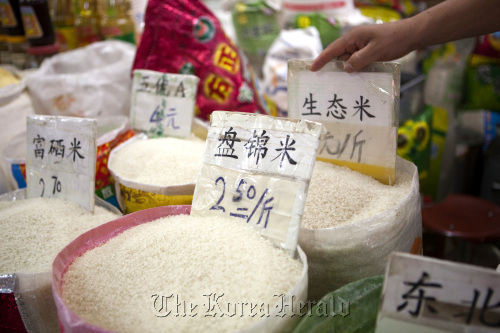China’s top priority is stabilizing prices and the government doesn’t plan to alter the direction of economic policies, Premier Wen Jiabao said.
The slowdown in the economy is “reasonable” and within government expectations, Wen wrote in an article in the ruling Communist Party’s Qiushi magazine. An abstract was posted on the government’s website Wednesday.
Banks including UBS AG, Morgan Stanley and Deutsche Bank AG cut their growth forecasts for China last month as a slowdown in the U.S. economy and Europe’s debt crisis threaten the nation’s exports. Five interest-rate increases since mid-October, property curbs and lending controls have also cooled demand in the world’s second-biggest economy.
“The government is worried that even if inflation pressures are easing now, if they relax too much or let people think they are relaxing, inflation and expectations could rise again,” said Mark Williams, a London-based Asia economist at Capital Economics Ltd. “Growth is stabilizing rather than dropping sharply.”
 |
A vendor adjusts price displays in sacks of rice at a market in Beijing. (Bloomberg) |
Williams expects consumer-price gains eased to 6.1 percent last month from a year earlier after jumping the most in three years in July. The government is due to release August inflation data on Sept. 9.
The government needs to balance maintaining relatively fast growth, restructuring of the economy and managing inflation expectations, Wen wrote. “We need to bring down the pace of price increases without causing large fluctuations in the economic growth rate.”
China’s expansion eased to 9.5 percent in the second quarter compared with a year earlier from a 9.7 percent pace in the first quarter as the government wound down an unprecedented 4 trillion yuan ($627 billion) stimulus that helped the economy weather the global financial crisis in 2008.
“In general, the economy’s performance is sound,” the quality and pace of growth is improving and “some prominent contradictions are gradually easing,” Wen wrote in the magazine. The government will “decisively implement” measures to cool the property market, he said.
Wen’s comments give “no indication that he is contemplating a reversal of tightening measures put in place over the last 12 months despite the recent deterioration in the global outlook,” said Brian Jackson, a Hong Kong-based strategist with Royal Bank of Canada. Jackson expects one more increase in benchmark interest rates by the end of the year.
The Premier reiterated that China faces a “very complicated, unstable and uncertain environment both at home and abroad” and that the government needs to be aware of the risks.
UBS cut its forecast last week for China’s expansion this year to 9 percent from 9.3 percent while Deutsche Bank lowered its prediction to 8.9 percent from 9.1 percent. Both banks estimate growth will slow to 8.3 percent next year.
“The government is comfortable with the slowdown currently taking place and isn’t ready to relax policies in the near term,” said Kevin Lai, a Hong Kong-based economist with Daiwa Capital Markets Ltd.
In the latest effort to manage liquidity, the central bank told lenders they will have to include margin deposits in calculations of their reserve requirements starting Sept. 5. The move is intended to deal with the rapid growth in banks’ off- balance sheet lending that’s complicating the central bank’s attempts to control liquidity, according to Wang Tao, a Hong Kong-based economist for UBS.
(Bloomberg)




![[Herald Interview] 'Trump will use tariffs as first line of defense for American manufacturing'](http://res.heraldm.com/phpwas/restmb_idxmake.php?idx=644&simg=/content/image/2024/11/26/20241126050017_0.jpg)

![[Health and care] Getting cancer young: Why cancer isn’t just an older person’s battle](http://res.heraldm.com/phpwas/restmb_idxmake.php?idx=644&simg=/content/image/2024/11/26/20241126050043_0.jpg)

